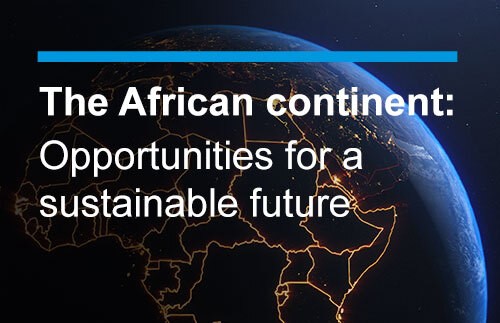Energy professionals
Exhibiting Companies
NOCs, IOCs, NECs and IECs
Country Pavilions
Despite the global trend of a transition away from fossil fuels, the energy transition will not occur at the same rate in every region.
COP26 highlighted that Africa’s transition will be at a different pace and scale to the rest of the world, as rapid population growth and industrialisation are increasing energy demand across the continent.
The recent McKinsey report “The future of African oil and gas: Positioning for the energy transition” explores the challenges and opportunities that the continent is facing as the momentum for sustainability builds and the pressure from increased domestic energy demand mounts.

This will be a central topic at ADIPEC 2022, where we will host some of the leading policymakers and industry leaders from the African energy sector to determine how the continent can achieve a just transition.
The report highlights that demand in Africa is forecast to be around 30 percent higher in 2040 than it is today, compared to a 10 percent global increase, leaving many African countries highly exposed to the global pressures of the energy transition. Their exposure is exacerbated by the fact that many of the region’s economies depend on oil and gas revenues, whilst their reserves cost more to produce and are, on average, more carbon-intensive than oil and gas from other regions.
As capital shifts towards cleaner investments, it will likely become increasingly difficult for the region to tap into its vast oil and gas reserves, causing the cost of oil and gas production to rise and profits to decrease. For countries relying on oil and gas exports for more than 50 percent of their total exports – which is half of all African oil and gas producers - this will have severe consequences.
Despite the challenges this poses for the region, the McKinsey report outlines several opportunities for African oil and gas producing nations to leverage the energy transition and strengthen the resilience and sustainability of their resource bases. These include:
Decarbonisation and improving cost efficiencies could help reduce emissions while also extending the licence of existing resource bases to operate in the future. McKinsey highlights the role that existing technologies can play in decarbonising the extraction and production of hydrocarbons, including in optimising operations, embracing sustainable design and capturing CO2. The report also suggests that governments have a key role to play in improving the cost efficiencies of production in the region, encouraging them to explore optimising their fiscal regimes to improve their resources’ position on the resource supply curve; reducing operating costs by addressing regional insecurity; and implementing measures to improve the ease of doing business.
As energy demand increases across the continent, the need for projects that boost energy supplies will rise. McKinsey suggests that investment in lower-carbon-energy infrastructure projects – such as gas pipelines, processing infrastructure, and liquified petroleum gas, could enable Africa countries to promote intraregional trade and boost global exports of African energy projects, whilst also helping to strengthen regional energy access.
Investing in renewable energy projects will be essential to securing future energy resilience. McKinsey argues that alternative energy sources, such as solar and wind energy, have attractive outlooks in the region and have experienced rapid cost improvements since 2009, whilst the unit costs of blue and green hydrogen projects is also expected to decrease in the near future.
Supporting a progressive energy transition in Africa will require pragmatism from the global community and a step change in investment from both government agencies and financial institutions alike.
At ADIPEC 2022, we will showcase the action that is already underway across the continent, facilitate synergies between decision-makers, business leaders and companies that will spur growth and innovation, and lay the groundwork for critical conversations at COP 27 and 28 about how to balance the challenges of achieving net-zero targets with the need for short-term energy security and affordability,
Join us at #ADIPEC 2022 - from 31st October to 3rd November - to tackle the future of #Energy together.
#ADIPEC #ADNOC #oilandgas #energy #innovation #technology #lowcarbon
If you would like to contribute your thought-leadership to ADIPEC news and insights, please contact us at media@adipec.com.
Explore and connect with 2,200 exhibitors, including 54 NOCs, IOCs, NECs and IECs and 30 exhibiting country pavilions, while exploring specialised industry areas.
Showcase your latest strategies and innovations that are defining the future of energy to an audience of over 184,000 energy professionals.
Gain exclusive access to strategic and technical insights from 1,600 speakers including ministers, global policy makers and energy CEOs.